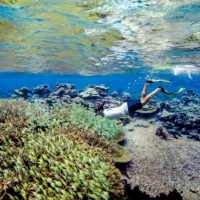
Fishermen and conservationists are clashing over President Donald Trump’s executive order to reopen protected waters in the Pacific to commercial fishing.
The decision would allow access to the Pacific Islands Heritage Marine National Monument.
U.S.-flagged ships would be authorized to fish commercially within 50 to 2,000 nautical miles outside the monument’s boundaries.
Members of the Hawai‘i Longline Association (HLA) released a statement explaining the “significance of the proclamation for Hawai‘i’s fishing industry.”
“This is recognition that sustainable fisheries and ocean protection can be achieved and balanced within U.S. national waters,” said HLA Executive Director Eric Kingma.
“Previous presidents have mishandled the Antiquities Act to create huge closed areas that banned commercial fishing, with most of these closures occurring in the U.S. Pacific Islands. Of the U.S. EEZ waters that are closed to commercial fishing, over 90% of the area is found in the U.S. Pacific Islands Region.”
Environmentalists, however, feel the decision would reverse years of progress.
“The idea that you can just go in and commercially hammer the monument and everything is going to be okay kind of goes against not only the science, but some of the reasons the monument was protected in the first place,” said Mahesh Cleveland of Earthjustice.
Tara Sesepasara Williams, whose late father Va‘amua Henry Sesepasara was Director of the Department of Marine and Wildlife Resources, said in a letter to the editor that the president’s decision “threatens the delicate balance of our ocean ecosystem,” a cause championed for decades by her late father.
“His tireless work establishing these very restrictions is now undone with a single stroke of a pen, seemingly fueled by a disregard for scientific understanding and long-term consequences,” she wrote.
Among the concerns she raises is the depletion of target species. She claims unsustainable fishing practices can decimate fish populations, pushing them toward collapse and disrupting the entire food web.
She also points out that the sheer scale and advanced technology employed by large commercial fleets can lead to overfishing, depleting fish stocks that smaller local operations rely on for their livelihoods.
She says industrial vessels can also damage local fishing gear and disrupt traditional fishing grounds, further limiting the catches available to those who have sustainably fished these waters for generations.
Another concern is bycatch and habitat destruction. She says indiscriminate fishing methods often result in the capture of non-target species like marine mammals, sea turtles, and seabirds.
According to Sesepasara-Williams, “While short-term profits may be gained, the collapse of fish stocks due to overfishing ultimately harms local economies that depend on a healthy ocean ecosystem for fishing, tourism, and other resources.”
Photo: Virgin Islands Free Press




